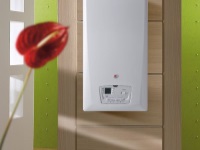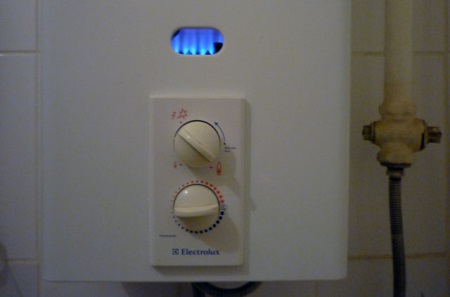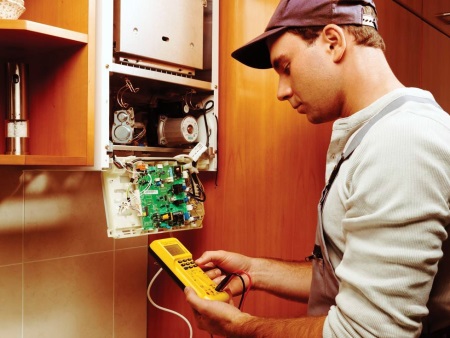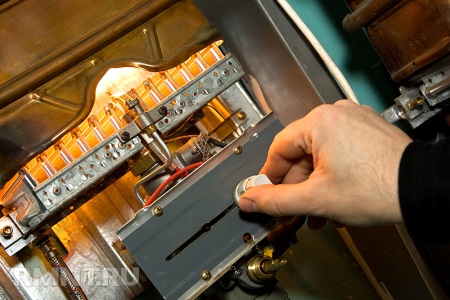What to do if the gas water heater noises, whistles, cracks or clicks?

Usually, the operation of the gas speaker is accompanied by sounds associated with the burning of the flame and the flow of water inside the unit. However, sometimes the user may hear whistling, popping, and other extraneous noise from the equipment. To understand why a water heater can whistle and make noise, you must first learn about the device of this type of water heaters, as well as the peculiarities of the functioning of gas boilers.



Whistling when turning on
If, by turning on the speaker, you heard a pop, it is a sign of problems with the flow of gas. Each appliance has a working area in which gas accumulates when the equipment is turned on, as well as its gradual connection with the air. If the volume of accumulated gas and air meets the manufacturer's calculations, there will be no popping. If the gas and air accumulate in excess, it causes a small volume explosion.

It causes not only a loud popping sound, but can also damage the chimney, so this situation should be eliminated immediately.
The author of the following video offers his own solution to this problem. By watching his video, you can get rid of the pop when you turn on the gas boiler on your own.
The boiler buzzes and makes noise during operation
The cause of the noise during water heating is sometimes insufficient draft. Therefore, in the noisy equipment in the first place check it. Lighted match or lighter is brought to the control holes or a special hatch at the top of the speaker. If the flame is deflected to the side of the device, the draught is sufficient. Otherwise, you should take care of cleaning the chimney duct.
Also to the occurrence of noise can lead to insufficient air flow into the room, for example, if you installed plastic windows in the kitchen. The gaskets in these windows interfere with the natural ventilation of the room. In this case, you should simply control the air flow to eliminate the noise.
Another reason for noisy operation is that the ignition burner wick is dirty. And then to eliminate the noise it is enough to clean the nozzles. A similar situation is possible with clogging of nozzles in the main burner, then after its cleaning the hum during operation of the speaker disappears.

In modern speakers, turned on with the help of electric ignition, the cause of the noise during operation can be as follows:
- Discharged batteries. As a result, the gas-air mixture is ignited with difficulty. In such a situation, the batteries need to be replaced.
- Breakdown of the sensor that controls the water supply. Often its failure is caused by oxidation of the contact group. Usually this sensor is indestructible, so it is replaced.
- Failure of the spark plug, due to which no electric spark is created. Most often it shifts after many heating-cooling cycles. By returning the spark plug to its nominal position, you will restore the spark generation capability and eliminate the extraneous noise.
- Problem with the mechanical ignition retarder. Its presence can be determined after removing the assembly and shaking it - normally you should hear the noise of the ball moving inside the retarder. If there is no sound, it indicates that the ball is dislodged. You can get it back in place with a soft wire.

Column Whistling
If there is a monotonous loud whistling coming from the equipment, the first thing to do is to determine where it is coming from. To do this, turn off the gas tap, then open the hot water tap. Further action depends on the resumption or absence of "crackles":
- If the whistling has appeared, its occurrence is related to the water path. The most common cause of this sound is scale deposits in the heat exchanger or a foreign object in the pipe. In this case, the performance of the speaker decreases. In this case, to get rid of the whistling it is necessary to clean the heat exchanger from scale, and to wash out the foreign object from the speaker will help reverse flow.
- If there is no whistling sound, the cause was problems in the gas path. Most often they are related to a defect in the valve modulating the flame power. Then the whistling appears only at a certain power, and to eliminate it, it is necessary to adjust the power in any direction. Another common cause is clogging of the tract. Whistling sounds appear at any power. You'll have to do an unscheduled cleaning to locate the clog, which is best left to a professional who works with gas equipment.
By watching the following video, you will be able to clean the heat exchanger from scale on your own without having to call a handyman.




